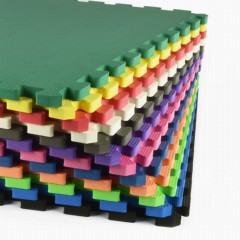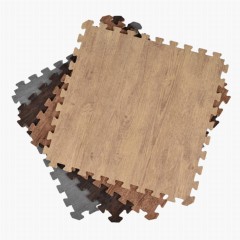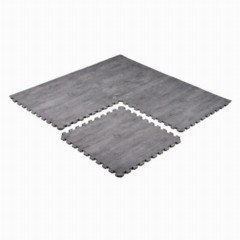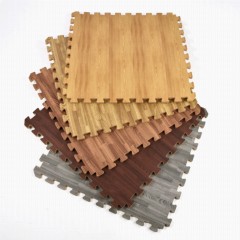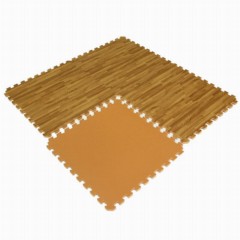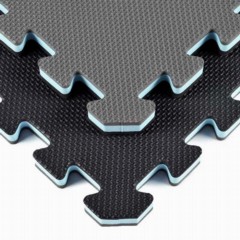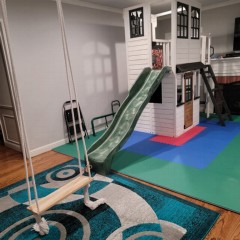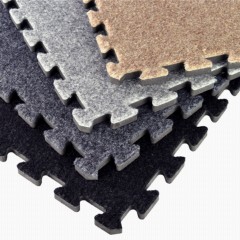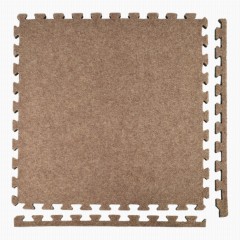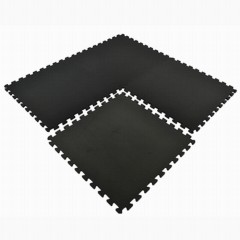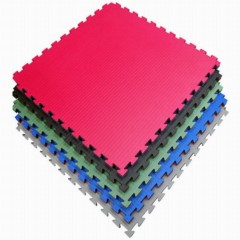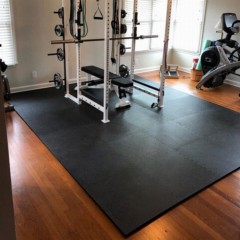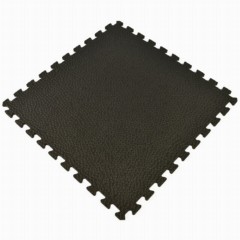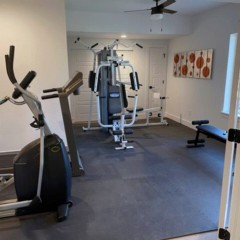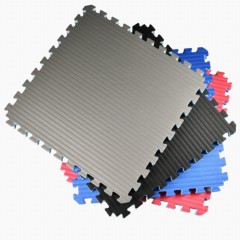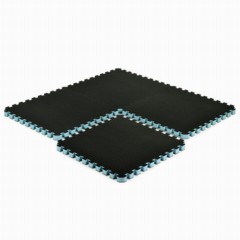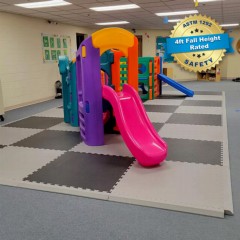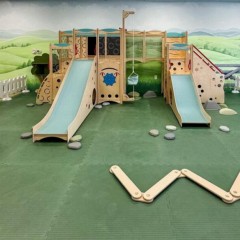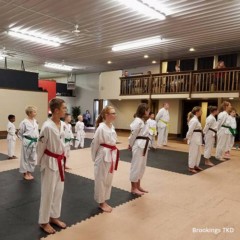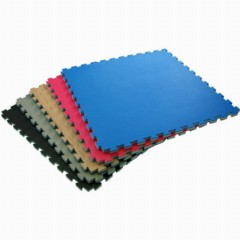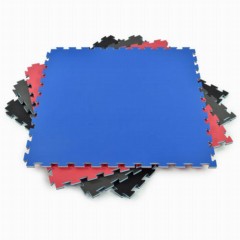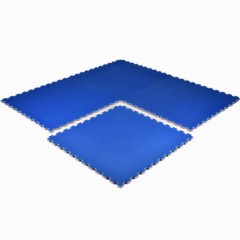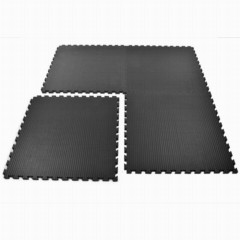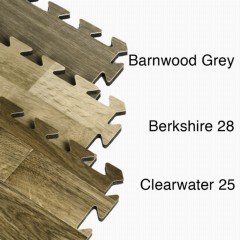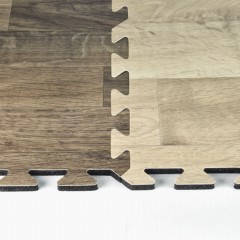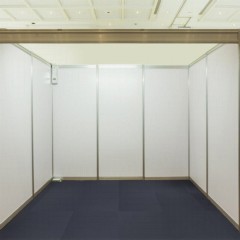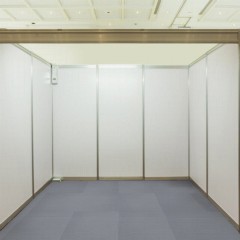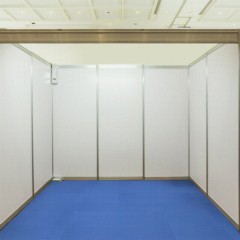Options for Interlocking Foam Mats
Interlocking foam mats are among the most popular types of flooring that we offer at Greatmats. They are easy to install, they’re available in many colors and designs, and they are more durable than you may think.
Beyond an easy installation process, our interlockable foam mats are also easier on the body of athletes than other types of flooring used in exercise areas and in fitness centers. This is a forgiving style of flooring.
Primary Benefits of Interlocking Foam Mats
When you are looking for a flooring installation you can do yourself and save money versus hiring a pro, these tiles are perfect. Even novices can do a DIY install with these pieces.
Some other benefits include:
- Lightweight material that’s easy to move to any location
- Permanent flooring installations
- Temporary flooring installations
- Cushioned material that protects leg, ankle, and hip joints during workouts
- Multiple color options
- Multiple faux wood grain options
Locations to Use Interlocking Foam Mats
Because of the significant versatility our foam flooring offers and because of the ease of installation, you can deploy them almost anywhere successfully.
- Homes: Use them in a basement to create a surface that’s more comfortable than bare concrete for hanging out, or for an exercise room at home. It also provides cushioning for kids’ playrooms and bedrooms.
- Kids’ care: In areas where children will be running and playing – and making messes – easy-to-clean connecting foam mats are ideal. Use them at daycares, preschools, and indoor play areas.
- Commercial facilities: Commercial fitness centers and gyms receive a high level of cushioning with this flooring. They work well in martial arts studios, exercise areas and dog agility studios. Use them in trade show booths as well, because they look great and they are lightweight for transport.
Interlocking Foam Mats Q&A
How do you clean interlocking foam matting?
To
clean foam matting squares, start by sweeping or gently vacuuming the surface. (Some vacuums could mar certain surfaces.) Damp mop the surface if needed. For a stubborn stain, consider using a scrubber brush.
How do foam puzzle mats compare to interlocking PVC and rubber tiles?
All three options are flexible. Foam is the lightest and most cushioned option of the three. Rubber is the most durable. None of them will absorb water, but flooring made of rubber puzzle pieces is most likely to allow some permeation if soaked for long periods of time or pressure washed. For that reason, rubber tiles are often classified as partially nonabsorbent or water-resistant.
How thick should foam mats be for kids?
When you are looking to buy interlocking foam mats to install for kids spaces,
understanding mat thickness measurements is important for safety. Under normal uses in a playroom or bedroom, 5/8 or 1/2 of an inch is usually sufficient. For athletic facilities for kids, like martial arts studios, 1 inch or more is a common thickness.
What sizes are interlocking floor mats?
Because of the lightweight design, EVA tiles can be a large size individually. This allows them to complete a floor layout quickly. You don’t have to worry about being able to lift a big stack of these large tiles.
Common sizes of interlocking tiles are 2x2 feet and 1x1 meter (or 3.28x3.28 feet).
Are foam mats good for insulation?
When going over a concrete floor,
foam connecting mats can provide some insulation from the cold feeling of the concrete, such as in a basement or in an athletic facility. Thicker materials tend to provide a greater level of insulation than thin interlocking squares.
 $635 /Tile You Save 38%$1.64/sqftShips Out in 1-3 Working Days Free ShippingShop$1298 /Tile You Save 43%$3.35/sqftShips Out in 1-3 Working Days SustainableShop$3189 /Tile You Save 24%$2.95/sqftShips Out in 1-3 Working Days SustainableShop$2160 /Tile You Save 25%$2.01/sqftShips Out in 1-3 Working Days SustainableShop$2085 /Tile You Save 29%$1.94/sqftShips Out in 1-3 Working DaysShop$1598 /Tile You Save 28%$1.49/sqftShips Out in 1-3 Working Days SustainableShop$2380 /Tile You Save 22%$2.21/sqftShips Out in 1-3 Working Days SustainableShop$87856 /Kit You Save 20%$9.07/sqftShips Out in 4-6 Working DaysShop$1,69632 /Kit You Save 20%$8.76/sqftShips Out in 4-6 Working DaysShop$3,27104 /Kit You Save 20%$8.44/sqftShips Out in 4-6 Working DaysShop$3028 /Each You Save 20%$7.80/sqftShips Out in 4-6 Working DaysShop$14250 /Kit You Save 45%$1.47/sqftShips Out in 1-3 Working DaysShop$28525 /Kit You Save 44%$1.47/sqftShips Out in 1-3 Working DaysShop$57025 /Kit You Save 44%$1.47/sqftShips Out in 1-3 Working DaysShop$85525 /Kit You Save 44%$1.47/sqftShips Out in 1-3 Working DaysShop$26275 /Kit You Save 33%$2.71/sqftShips Out in 1-3 Working DaysShop
$635 /Tile You Save 38%$1.64/sqftShips Out in 1-3 Working Days Free ShippingShop$1298 /Tile You Save 43%$3.35/sqftShips Out in 1-3 Working Days SustainableShop$3189 /Tile You Save 24%$2.95/sqftShips Out in 1-3 Working Days SustainableShop$2160 /Tile You Save 25%$2.01/sqftShips Out in 1-3 Working Days SustainableShop$2085 /Tile You Save 29%$1.94/sqftShips Out in 1-3 Working DaysShop$1598 /Tile You Save 28%$1.49/sqftShips Out in 1-3 Working Days SustainableShop$2380 /Tile You Save 22%$2.21/sqftShips Out in 1-3 Working Days SustainableShop$87856 /Kit You Save 20%$9.07/sqftShips Out in 4-6 Working DaysShop$1,69632 /Kit You Save 20%$8.76/sqftShips Out in 4-6 Working DaysShop$3,27104 /Kit You Save 20%$8.44/sqftShips Out in 4-6 Working DaysShop$3028 /Each You Save 20%$7.80/sqftShips Out in 4-6 Working DaysShop$14250 /Kit You Save 45%$1.47/sqftShips Out in 1-3 Working DaysShop$28525 /Kit You Save 44%$1.47/sqftShips Out in 1-3 Working DaysShop$57025 /Kit You Save 44%$1.47/sqftShips Out in 1-3 Working DaysShop$85525 /Kit You Save 44%$1.47/sqftShips Out in 1-3 Working DaysShop$26275 /Kit You Save 33%$2.71/sqftShips Out in 1-3 Working DaysShop